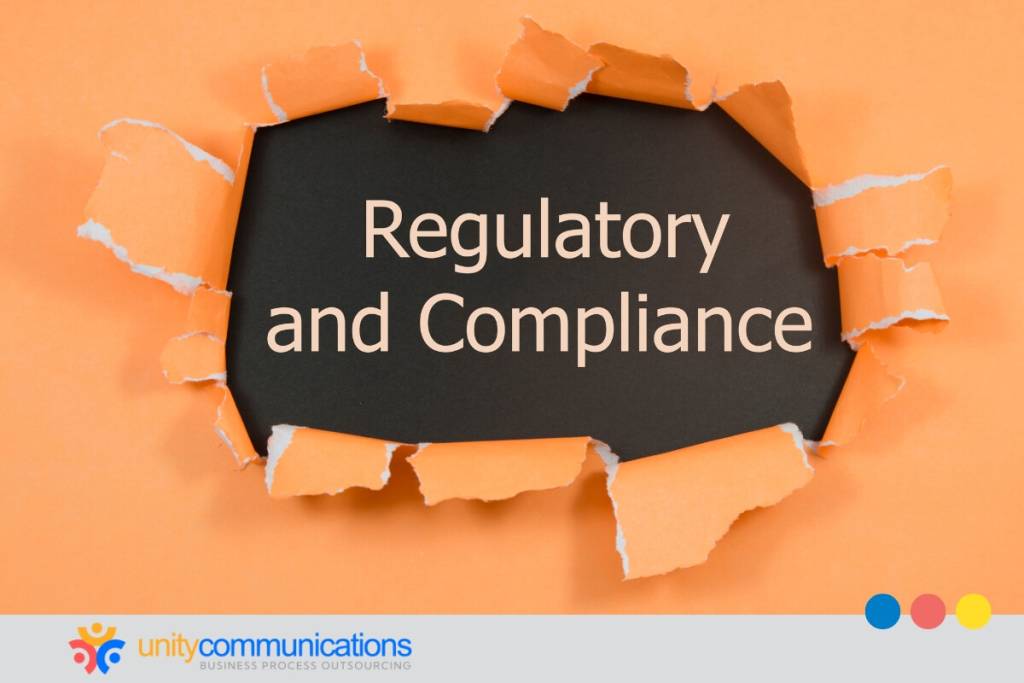Table of Contents
In the continuously changing outsourcing industry, service providers must stay current with regulatory requirements to maintain client trust, prevent legal risks, and ensure seamless operations.
Business process outsourcing (BPO) firms manage a large volume of sensitive data and must follow rigorous rules. They must also regularly update their practices to manage risks and protect sensitive information.
This article discusses the significance of BPO regulatory compliance, its types, and strategies for staying ahead of regulations.
Stay on this page to learn how to navigate regulations and develop effective tactics in today’s evolving outsourcing industry.
Why BPO regulatory compliance is crucial

What is BPO regulatory compliance? It refers to the outsourcing firms’ adherence to legal and industry-specific regulations. It brings service providers the following benefits:
- Protecting sensitive data. BPO providers frequently handle sensitive personal data, financial records, and protected health information (PHI). Securing this data per government policies is critical to prevent data breaches and misuse.
- Avoiding legal fines. Noncompliance leads to hefty penalties and legal consequences that can amount to thousands of dollars.
- Building client trust. Clients entrust BPO organizations with essential procedures and data. Commitment to regulatory compliance fosters confidence and credibility, enabling clients to continue collaborating and recommending services.
- Ensuring operational continuity. Compliance with rules guarantees that BPO operations run smoothly without delays due to legal disputes or regulatory measures. This stability is critical for providing consistent service and meeting client expectations.
- Enhancing competitive advantage. Adhering to regulations can set a BPO vendor apart, attract clients, and provide compliant firms with a competitive advantage.
- Improving internal processes. Tight policies and procedures frequently necessitate regulatory compliance, which can result in better internal processes, increased efficiency, and higher operational standards in third-party firms and contact centers.
- Facilitating international business. Compliance with international regulations is critical for BPO companies to enable smooth cross-border operations, extend their customer base, and operate in numerous locations without legal stumbling blocks.
- Reducing risk exposure. Adhering to regulations assists third-party providers in mitigating data intrusions and breaches, legal concerns, and reputational harm, improving long-term viability.
- Supporting ethical business practices. Compliance with rules frequently correlates with ethical business practices, strengthening the call center company’s reputation. It also builds a healthy corporate culture that attracts clients and talent while emphasizing integrity and responsibility.
Types of BPO regulatory compliance
BPO regulatory compliance depends on the industry in which an outsourcing firm operates, the services it offers, and the geographic location where it is based. Understanding the regulations that apply to a firm is vital for effective compliance management:
Data protection and privacy compliance
Data protection and privacy compliance entails following laws on personal data collection, use, storage, and disposal to ensure confidentiality, integrity, and lawful processing.
In particular, the General Data Protection Regulation (GDPR) and the California Consumer Privacy Act (CCPA) govern how a BPO company handles personal information. These regulations mandate strict data protection measures to safeguard sensitive data and privacy.
Industry-specific compliance
Industry-specific compliance ensures businesses meet sector-focused regulations, maintaining legal boundaries and standards for safety, quality, and operations. Various industries have specific compliance requirements that BPO companies must follow.
For instance, the Health Insurance Portability and Accountability Act of 1996 (HIPAA) sets standards for managing protected health information in the medical space. Similarly, the Payment Card Industry Data Security Standard (PCI DSS) covers payment processing and financial data security.
Labor and employment compliance
BPO firms must follow labor laws, including working conditions, employee rights, and workplace safety, to provide fair employment and ensure lawful workplace practices.
Labor and employment compliance for BPO companies entails observing specific laws and standards, such as the Fair Labor Standards Act (FLSA), Occupational Safety and Health Act (OSHA), and anti-discrimination laws.
Environmental compliance
BPO enterprises with large physical infrastructures or data centers must conform to environmental rules to reduce their ecological impact.
Environmental compliance for BPO operations includes adhering to the Waste Electrical and Electronic Equipment (WEEE) Directive and International Organization for Standardization (ISO) 14001 standards to manage waste, reduce emissions, and promote sustainable practices.
Cross-border compliance
BPO organizations operating abroad are bound to international regulations such as trade laws, import/export standards, and global data transmission requirements.
Cross-border compliance for BPO companies involves adhering to laws such as GDPR for data protection, World Trade Organization (WTO) rules for trade agreements, and customs regulations for import/export operations across multiple countries.
How to stay ahead of BPO regulatory compliance

Keeping up with government and industry standards necessitates proactive steps, ongoing monitoring, and a firm dedication to maintaining the highest standards. BPO firms can consider these measures to achieve regulatory compliance:
Implement comprehensive policies and procedures
Developing and implementing comprehensive policies and procedures is the foundation of regulatory compliance. Policies should cover all aspects of data handling, security measures, and operational practices to ensure they meet regulatory requirements.
Examine the following pointers when deploying comprehensive policies and procedures:
- Identify relevant regulations and standards. Understand the specific rules and standards applicable to your BPO operations (e.g., GDPR, HIPAA, and PCI DSS). Comprehensively analyze how these regulations influence your business processes and data-handling practices.
- Develop detailed policies. Formulate extensive policies covering data protection, security protocols, and employee conduct. Document and make them accessible to all employees.
- Establish clear procedures. Translate your policies into precise data collection, storage, transfer, audits, incident response, and data breach management procedures.
Launch regular training and awareness programs
Continuous training and awareness programs are crucial to educating staff on compliance requirements, data protection practices, and regulatory adherence.
Here are some effective methods when launching these initiatives:
- Assess training needs. Evaluate employees’ current knowledge and skills in compliance and data protection. Identify gaps to tailor training programs effectively.
- Develop comprehensive training materials. Generate detailed training resources, including presentations, manuals, and online modules. Use case studies to illustrate the importance of compliance.
- Conduct regular training sessions. Schedule mandatory, accessible training sessions for all employees. Use workshops, webinars, and e-learning platforms to cater to diverse learning preferences and schedules.
- Introduce interactive learning approaches. Use quizzes, role-playing scenarios, and group discussions to engage employees, foster participation, and enhance training responsiveness to employee needs.
Utilize advanced technology and tools
Sophisticated technologies and solutions, including data encryption and access controls, strengthen compliance efforts by safeguarding sensitive information and meeting regulatory standards.
Consider these strategies when utilizing advanced technology and tools:
- Implement data encryption. Deploy robust data encryption protocols, such as Advanced Encryption Standard (AES), to comply with industry standards and protect sensitive information.
- Deploy monitoring systems. Install systems to track and audit data access instantly, with alerts for suspicious activities to address compliance violations promptly.
- Utilize compliance management software. Automate regulatory tasks such as policy enforcement and audit preparation. Integrate solutions with existing systems to streamline organizational compliance efforts.
- Enhance access controls. Implement multi-factor authentication (MFA) and biometric authentication to restrict data access based on user roles and privileges, strengthening access security.
Conduct regular audits and assessments
Regular audits and assessments identify compliance gaps and areas for improvement by reviewing policies and operational practices against regulatory standards.
Check these guidelines to conduct this process properly:
- Identify audit objectives and scope. Specify audit goals—overall compliance or specific regulations—and the departments, processes, and systems to monitor.
- Develop audit checklists and procedures. Design detailed checklists covering regulatory requirements, operations, and data handling. Develop step-by-step audit procedures.
- Assign a competent audit team. Select auditors with compliance expertise. Ensure access to necessary resources for thorough evaluations.
- Conduct thorough document reviews. Review policies and contracts for regulatory compliance. Verify the accuracy and currency of practices.
- Perform on-site inspections. Conduct on-site inspections to observe practices and assess compliance. Interview key personnel for validation.
Engage with regulatory bodies
Maintaining communication with regulatory bodies offers insights and guidance, ensuring compliance practices stay current.
Apply these procedures when engaging with government regulators:
- Establish regular communication channels. Initiate regular meetings or calls with regulators to discuss industry developments and upcoming changes, maintaining open communication via emails or newsletters.
- Stay informed about regulatory updates. Monitor regulatory updates via publications and official websites. Additionally, attend seminars to stay updated on compliance standards.
- Seek guidance on compliance requirements. Proactively seek regulatory guidance for interpreting and implementing BPO-specific compliance requirements, ensuring accurate adherence without ambiguity.
- Participate in industry consultations. Attend regulatory authority events to provide input on proposed regulations. Additionally, contribute insights from practical BPO experiences to shape regulatory frameworks beneficial for the industry.
Develop a culture of compliance
Foster a compliance culture by promoting ethics, accountability, and commitment to regulatory standards at all levels.
Adopt these tactics to develop a compliance culture:
- Lead by example. Leadership should commit to compliance by following standards, clearly explaining their relevance, and modeling ethical behavior.
- Set clear compliance policies. Establish detailed compliance policies that outline expectations, processes, and repercussions for all employees and assure their accessibility and communication.
- Encourage open communication. Cultivate an environment where employees feel free to report compliance issues or possible violations without fear of retaliation. Set up anonymous reporting mechanisms, including hotlines or suggestion boxes.
- Recognize and reward compliance. Incentivize personnel who are deeply committed to compliance and ethical behavior. Launch appreciation programs that recognize outstanding compliance efforts and inspire others to follow suit.
The bottom line

BPO regulatory compliance is a strategic advantage that boosts reputation and sustains success through vigilance and high standards. However, staying ahead of regulations requires diligence and a deep understanding of compliance. This focus avoids penalties, builds client trust, and ensures operational continuity.
Let’s connect to learn more about how Unity Communications promotes BPO regulatory compliance to protect sensitive data, improve operational efficiency, and avoid reputational damage and fines.




